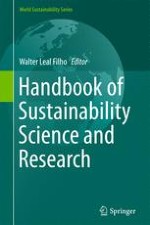2018 | OriginalPaper | Buchkapitel
(Inhibiting) Factors for (Un)Sustainable Behaviour in Relation to the Effects of Education for Sustainable Development: The Role of Psychological Constructs, Neurotransmitters and Ideological Impact on Consumer Behaviour
verfasst von : Kristof Dewaele, Daniel Fischer, Patrick Van Damme, Paul Verhaeghe
Erschienen in: Handbook of Sustainability Science and Research
Aktivieren Sie unsere intelligente Suche, um passende Fachinhalte oder Patente zu finden.
Wählen Sie Textabschnitte aus um mit Künstlicher Intelligenz passenden Patente zu finden. powered by
Markieren Sie Textabschnitte, um KI-gestützt weitere passende Inhalte zu finden. powered by
